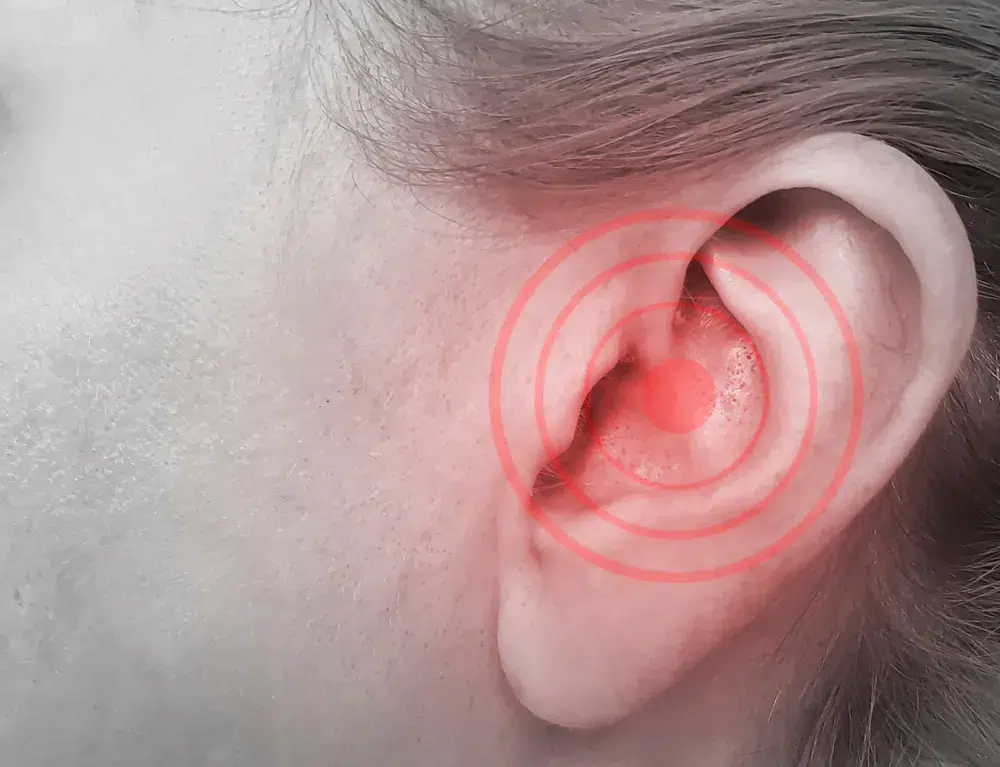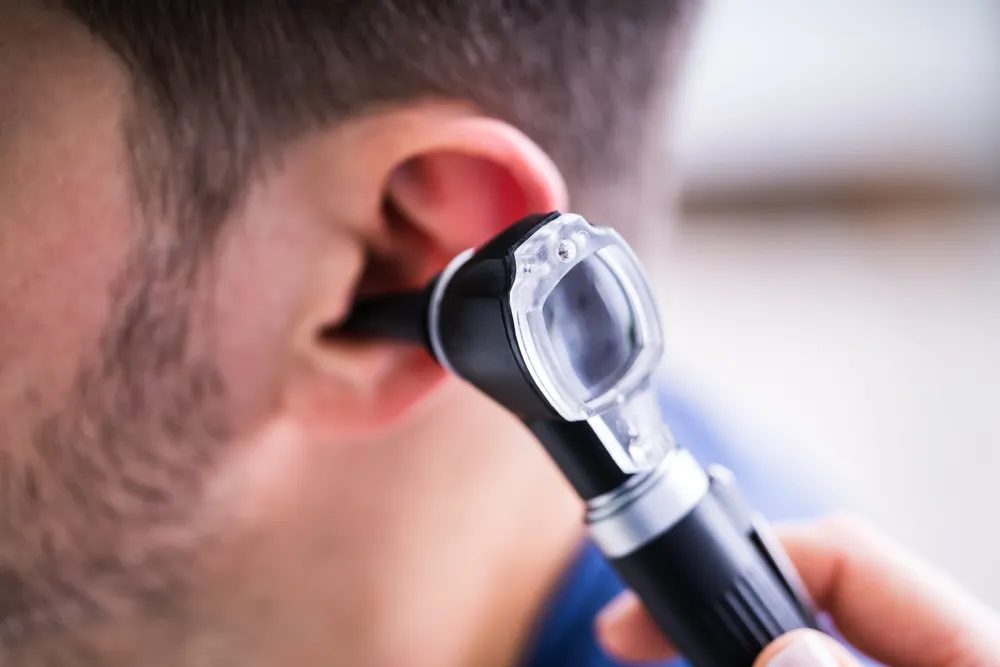People who have allergies often have signs like runny noses or watery eyes. Many people may not know this, though, but allergies can also make it hard to hear. If you don’t treat your allergies, you might lose your hearing. Penn Medicine Becker ENT & Allergy specialists have done study and found that allergies can make it hard to hear.

How Allergies Might Affect Your Hearing
- Untreated allergies can lead to swelling and fluid buildup in the middle ear, which may cause temporary hearing loss.
- Hearing loss caused by allergies can often be fixed once the allergies are handled and the swelling goes down.
- Congestion and blocked Eustachian tubes from severe allergic reactions can also impair hearing by preventing proper ear drainage.
- Regular allergy treatments, such as antihistamines or nasal sprays, can help prevent the potential for hearing loss by managing allergy symptoms.
- If you have hearing problems, consult a doctor about allergens and hearing.
How Allergies Affect Your Overall Well-being
Both your physical and mental health can be greatly affected by allergies. People with allergies have symptoms that can range from mild to serious and make it hard for them to do normal things. Some common allergy symptoms include sneezing, itching, and an allergic skin reaction. These symptoms can lead to an uncomfortable feeling and, in more severe cases, body harm.
Seasonal allergy symptoms can interrupt your daily routines, which may lead to a decrease in quality of life. The severity of symptoms differs from person to person, but the body’s immune response to allergens can make you feel tired, affecting your overall well-being.
Unpacking the Link Between Allergies and Hearing Issues
Allergies can have a substantial impact on the Eustachian tube, resulting in hearing issues. Fluid can accumulate in the middle ear as a result of tube swelling caused by an allergic reaction. This excess fluid may not only dampen hearing but also lead to fluid buildup, a primary contributor to allergy-related hearing loss. Additionally, the pressure and fullness create a ripe environment for allergy-induced hearing loss, possibly worsening issues like tinnitus.
To help people who have trouble hearing because of allergies, it’s important to understand this link.
Eustachian Tube: A Key Player in Our Hearing
The Eustachian tube is important for our hearing. It helps control air pressure and drains the middle ear. When allergens create inflammation in this canal, you may get a sensation of fullness in your ears. This can also have an impact on your balance because the Eustachian tube helps you maintain stability. If the tube swells, it can interfere with equilibrium.
There is substantial evidence linking allergies and hearing loss. Congestion and fluid accumulation in the middle ear, which can be caused by allergies, can temporarily impair hearing. Allergy symptoms often worsen the already-present hearing loss, however their intensity varies.
Discover the Hearing Problems Triggered by Allergies
Allergies can lead to various hearing issues, significantly affecting how well a person can hear and decreasing their overall quality of life.
- Conductive hearing loss happens when the middle ear fills with fluid, preventing sound waves from passing through normally. This causes the ears to feel full or obstructed all of the time.
- Sensorineural Hearing Loss involves damage to the inner ear that develops over time because of allergies. It’s less common but significantly affects hearing ability.
- Conductive-related hearing loss combines symptoms from both the inner, outer, or middle ear, creating a complex situation for hearing.
People might notice their hearing seems muffled, making sounds appear distant or unclear. This issue, referred to as muffled hearing, often relates to how much fluid has built up and can change depending on the intensity of the allergy.
Tinnitus symptoms such as ringing or buzzing in the ears might worsen as a result of allergies. These unpleasant sounds can complicate daily life by making it difficult to focus or relax.
Navigating Through Conductive Hearing Loss
Fluid accumulation in the middle ear, a symptom of allergies, can exacerbate already conductive hearing loss. Conduction hearing loss occurs when an obstacle prevents sound from reaching the ear in its natural manner.
Inadequate management of allergies might result in conductive-related hearing loss. To avoid this, it is essential to treat allergic responses promptly.
Understanding Sensorineural Hearing Trouble
Sensorineural hearing loss differs significantly from conductive hearing loss, primarily resulting from allergies. Allergies can lead to temporary, conductive types of hearing loss. Nevertheless, if these allergies are not treated, they can damage the inner ear and lead to permanent hearing loss. In order to effectively manage the situation and prevent additional harm, it is essential to understand the differences between these two.
Secure Your Safe Treatment Experience with PennMedicine
Join our satisfied clients who’ve experienced safe, effective treatments.
Spotting the Signs of Hearing Trouble Due to Allergies
Early hearing loss signs should be taken seriously, particularly if they could be connected to allergies. Tinnitus is a main sign to be on lookout for. Tinnitus is the ringing or buzzing in the ears brought on by no outside noise.
People who have tinnitus often lose their hearing at the same time. This might make it hard to understand what people are saying or keep up with talks where there is a lot of background noise.
Allergy symptoms like congestion or sinus pressure can make these hearing problems worse, leading to a temporary decrease in your ability to hear. If you notice these signs early, you may be able to get the right treatment quickly, which could help stop long-term damage.
Finding Out If Allergies Are Affecting Your Hearing
When you’re curious about whether allergies are impacting your hearing, it’s smart to book a hearing test appointment. These hearing tests can help identify any hearing loss that might be due to allergies.
It’s important to find out what your issues are by taking tests. If you tell your doctors what causes your allergic responses, they can come up with effective ways to treat you.
Starting with allergy shots is a common treatment method. They can greatly reduce allergy symptoms and might help improve any hearing issues linked to allergies.
Tackling Hearing Loss Caused by Allergies Head-On
Managing and treating hearing loss caused by allergies requires understanding the available strategies. Allergy treatments that can help include medications designed to reduce allergic reactions. These treatments can also help improve issues related to hearing. Hearing aids are often suggested for those with mild to moderate hearing loss. For those seeking options that do not involve surgery, an alternative hearing aid may be appropriate.
Staying Ahead of Hearing Loss Due to Allergies
Avoiding allergens is key to reducing the risk of allergy-related hearing loss. During peak allergy season, when pollen and dust mites are at their worst, taking the right precautions can protect your health.
Regular allergy and hearing screenings can help detect and manage symptoms early. For those affected by seasonal allergies, pollen allergy treatment in Philadelphia can provide relief and help prevent complications like hearing issues.

If you’re worried that allergies could be impacting your hearing, getting advice from experts is key. And if ear pressure, drainage, or sharp pain develops, our same-day ear infection care team can assess whether infection is involved. At Penn Medicine Becker ENT & Allergy, they offer tailored care and full treatment choices for various ear, nose, and throat problems, including hearing loss due to allergies. Their specialized team and facilities across Central and Southern New Jersey, and Philadelphia, are ready to help you.
To find out how you can safeguard your hearing and effectively handle allergy symptoms, make an appointment today.

